Perennial grass solutions for macadamia orchards



CANAGIO
GREEN MULTILEAF BUTTERHEAD LETTUCE FOR YEAR ROUND PRODUCTION

• Single cut variety with easy leaf separation
• Dark red medium sized uniform leaves
• Non folding leaf habit
Strong contrast between red and green
• Suited for hydroponic production
• Slow bolting
DARK RED MULTILEAF LETTUCE FOR ALL YEAR PRODUCTION
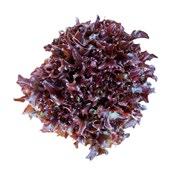


• Dark red colour with no spiky leaves
• High yield potential
• Narrow main vein
• Uniform size and shape
• Slow bolting
Suited for hydroponics
ESTAGIO
TRIPLE RED OAKLEAF LETTUCE FOR YEAR ROUND PRODUCTION
• Dark red colour
• Uniform medium sized leaf formation
• Good red and green contrast
Slow bolting
• Suited for hydroponics
RUBAGIO
RED MULTILEAF BUTTERHEAD LETTUCE FOR YEAR ROUND PRODUCTION
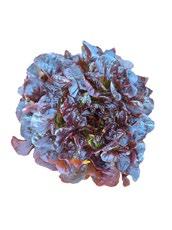
• Single cut variety with easy leaf separation
• Dark red medium sized uniform leaves
• Non folding leaf habit
• Strong contrast between red and green
• Suited for hydroponic production
Slow bolting
Edition 212 ISSN 1015-85 37 www.vegetablesandfruitmagazine.co.za
COVER
EDITORIAL
Willie Louw (Group editor)
Carien Daffue (Editor) 082 927 8294
018 293 0622 info@mediakom.co.za PO BOX 20250, Noordbrug, 2522
ADVERTISING
Jana Greenall
011 476 3702 082 780 9914 mediacom@lantic.net
DESIGN
Mercia Venter studio.chatnoir@gmail.com
NEWS
4 Load shedding an additional threat to orange exports and the jobs
4 Decrease in agricultural sector employment a worrying sign
5 Early yielding pear Rosy-Lwazi dazzles export market
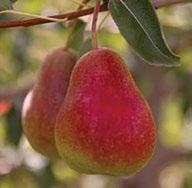
5 Shell supporting the farm of the future
6 South African farmers should target China and India among the Brics
6 The heat is on
7 Global coalition of fresh produce calls for urgent policy measures
8 Change to drier El Niño cycle could compound power woes
10 Starke Ayres field day
10 Mot se moer
11 Load shedding expected to cost sugar industry more than R723 million in 2023
Bly ingelig en volg ons op Facebook. Keep up to date and follow us on Facebook.


Besoek ons webtuiste | Visit our website: Groente & Vrugte | Vegetables & Fruit www.facebook.com/SAGroenteenVrugte
www.vegetablesandfruitmagazine.co.za
1 Year @ R235.00 (6 issues) 2 Years @ R450.00 (12 issues)
In case of address change, please quote or attach previous address label
MACADAMIA
12 50 years of macadamia nursery tree propagation
14 Perennial grass solutions for macadamia orchards
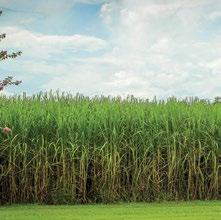
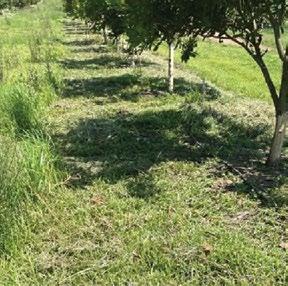
16 Die beheer van neutboorder in makadamias
BRASSICA
In South Africa, Brassica is not indigenous and thus is not evaluated in terms of the Red List of South African plants. Three species are naturalised in South Africa, but none are declared invasive weeds. Available on subscription only - visit website: Slegs met intekening beskikbaar - besoek webblad: www.vegetablesandfruitmagazine.co.za
18 Know your diseases: Alternaria on brassicas

GENERAL
20 Netafim drives cost-efficient dripline supply
22 Omvattende en gebalanseerde programme vir gewasbestuur lewer kwaliteit gewasse
24 Technology takes the guesswork out of spray applications
26 SA agriculture exports showed resilience in 2022 despite headwinds
28 Strategic approach to the EU Green Deal
The Citrus Growers’ Association (CGA) has again written to Minister Ebrahim Patel requesting that he urgently convene a World Trade Organisation (WTO) panel to adjudicate on the new false coddling moth (FCM) regulation governing the importation of South African oranges to European Union (EU) markets.
This action step becomes even more critical in light of ongoing load shedding, making the ability of growers to fully comply with the new regulations by the time the 2023 export season kicks in at the end of March, even more of a challenge.
The new unjustified and discriminatory regulations require all oranges shipped to the EU to be precooled to below two degrees Celsius and then maintained at this temperature for 20 days. To comply, growers will have to use extremely costly, specialised container equipment in short supply, which will also not be able to accommodate the huge volumes of fruit exported from South Africa to the EU. As a result, an investment in cold storage technology and capacity of nearly R1,4 billion is required to enable full compliance putting further financial strain on growers.
However, this new equipment will also not be operational by the time the season kicks off at the end of the month, which means that an estimated 15% to 25% of oranges destined for the EU will more than likely not be shipped. The potential loss of income for local growers is amounting to more than R500 million this year.
Compounding this problem even further is the impact of ongoing load shedding on the citrus value chain. While the CGA welcomes the decision by national government to exempt ports from power cuts under the current National State of Disaster, cold stores located outside of the port terminals
will struggle to precool oranges below two degrees Celsius and maintain this temperature before the containers enter the ports and are shipped off to the EU.
The fact is that these new requirements have been scientifically proven to be unnecessary, considering South Africa’s existing rigorous risk management system ensuring that 99,9% of oranges entering the EU are pest free. Only two FCM interceptions were detected in the over 400 000 tons of oranges shipped to the region in 2022. Furthermore, a significant portion of South Africa’s commercial orange production will also not be able to withstand the new prescribed cold treatment, making the new regulations completely nonsensical.

As a result, the new regulations, which are clearly driven by Spanish political agendas to keep South African citrus out of the EU, could result in large gaps in the global supply chain and higher prices for European consumers.
Most critically, if the current impasse between South Africa and the EU is not resolved before the 2023 export season kicks off, thousands of local growers might not survive, putting the future sustainability of the entire industry, which sustains over 140 000 jobs and brings in R40 billion in export revenue annually, at risk.
The CGA is grateful for the support shown by the national government to date, including the Department of Trade and Industry (DTIC) requesting consultations at the World Trade Organisation (WTO) level with the European Union (EU) over the new regulations. However, these consultations have not resolved the current impasse. The CGA urges Minister Patel to put further pressure on the EU by calling for the establishment of a WTO panel to adjudicate on the matter before the 2023 export season kicks off.
AGRI SA
Agri SA is distressed by the decrease in agricultural sector employment as reported by Stats SA in the Quarterly Labour Force Survey for Q4: 2022. The report, released recently, shows a decrease of 12 000 jobs in the agricultural sector.
In a statement, Agri SA says though the loss of jobs is marginal for now, it points to the increasingly challenging environment in which farmers operate. The sector has shown itself to be remarkably resilient and was counted among the best performing sectors even at the height of the Covid-19 pandemic. But the tide is turning for one of the country’s most labourintensive sectors – rising input costs, endemic load shedding and crumbling infrastructure is placing severe strain on the agricultural sector.
“The commitments made by President Cyril Ramaphosa in
the recent SONA need to be an immediate priority to help save jobs and guarantee the nation’s food security.”
Agri SA says clarity is needed on the regulations published for the State of Disaster on the energy crisis. While food production and storage have been included as essential infrastructure, detail is needed as to what this entails and what relief it will provide for farmers.
“Moreover, the extension of the diesel levy rebate must be accompanied by the fast-tracking of the processing of claims and a reduction in the onerous red tape currently hampering the system. This is the only way to alleviate the ongoing burden of loadshedding on farmers, preserving critical rural jobs.”
Urgent action is needed to protect this sector and Agri SA remains committed to ensuring support for the sector so we can continue to provide both food security and livelihoods at this challenging time for South Africans
South Africa’s 2022/23 deciduous fruit season delivered something special to the market this January, a brand new very early red blush pear cultivar trademarked as Rosy-Lwazi. The variety has been bred locally by the Agricultural Research Council (ARC) and commercialised by Culdevco.
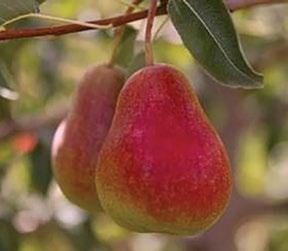
Rosy-Lwazi expands South Africa’s blush pear cultivar range and widens the marketing window as it is now the earliest blush pear available on the market, which means early access overseas and therefore, better prices.
“As this variety is harvested so early in the season, it will be the first red blushed pear from South Africa to reach the overseas consumer,” Mishkaat Anderson, General Manager, Culdevco, said. “According to our northern hemisphere market evaluations in the previous season, all indications are that its gorgeous red blush colour, great quality and taste, and long shelf life will do exceptionally well in these markets.
“Rosy-Lwazi really is a quality pear, crisp and delicious with no mealiness in the mouth.”
This blush pear variety began its journey in 2007 when it was singled out by an ARC breeder, Taaibos Human, as a potentially profitable cultivar. Sixteen years later, in the first week of January 2023, the first Rosy-Lwazi was harvested at Eselfontein farm just outside Ceres in the Western Cape.
Culdevco joined the Eselfontein manager, Vernon Bassett, in the Warm Bokkeveld to begin the first commercial harvest of the variety.
“It is always very rewarding to experience a harvest day,” said Bassett. “This day symbolises all the years of effort and
Koos Uys from Standerton is one of the lucky recipients of a brand-new drone, compliments of the Shell Lubricants “Farm of the Future” themed competition.
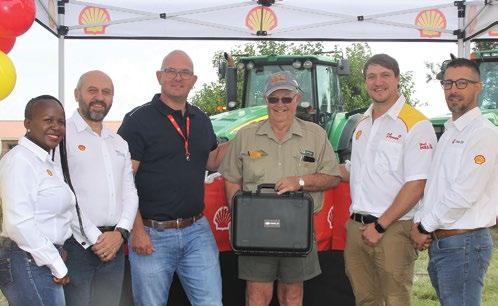
To qualify for the prize, customers had to buy Shell products from Atlas Oil Delmas, Bell Supply Co and Oil at FPS and scan the QR code.
The handover of the Mavic 3 Enterprise Series drone, worth R135 000, took place on on Uys’ farm, Rietpoort, near Standerton in Mpumalanga. “I have been using Shell lubricants for many years and have never experienced problems,” Uys said.
Uys said they consider drone technology extremely useful for farm management. “We have been using an older generation drone for a couple of years to ensure farm operations are running smoothly. With the new drone, monitoring remote areas, which used to take hours of walking and driving, can now be completed in a much shorter time.
finally, we can reap the benefits of the fruit.
“We initially planted over 500 trees in 2018 and anticipate that, as our tree volume grows, we can increase our tonnage per hectare. This year we harvested 28 tons for export and we anticipate that we will reach the recommended tonnage of 55 to 60 tons per hectare in the near future. This season was our second year of exporting Rosy-Lwazi.
“It’s an attractive and adaptable early variety for the producer, as the harvest coincides with very little volumes of red blushed pears being available in the northern hemisphere marketing window. At that window, profitable prices are achievable if quality blush pears can be exported to these countries. Rosy-Lwazi shines when it comes to its attractive red blush, earliness, flavour, texture and storage ability,” Bassett said.
The 2021/22 season saw the first export harvest for the new blush pear variety and the fruit made its way to the Middle East and Europe where it was very well received.
Culdevco is focused on keeping the homegrown advantage for the South African deciduous fruit producer and industry. Its partnership with the ARC ensures unique and robust cultivars continue to make a significant impact on the industry. Their latest offering, the novel Rosy-Lwazi blush pear, is set to be their latest success story.
“We look forward to incorporating this new drone in monitoring our farm operations, especially cattle herd management,” Uys said.
Benedicta Mankhili, B2B Marketing Manager at Shell, said the promotion was in support of Shell’s “Farm of the Future” campaign, which is focused on the use of innovative and sustainable lubricants and services to ensure agricultural equipment is operating at peak performance now and in the future
Not a formal economic or trade bloc, the business communities from each country typically seek ways to deepen trade and investment with other Brics partners. The SA Brics Business Council has various working groups that engage with other member states to this end. This year the council will also lead the agenda, in line with its political principals chairing Brics.
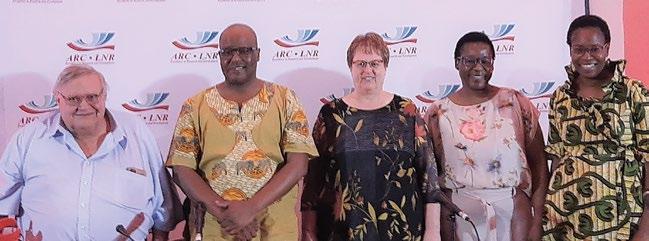
The main interest of SA agriculture and agribusiness in the grouping is to advance agricultural exports, specifically to China and India. These are countries that have relatively solid economic growth prospects and large populations (and therefore markets), though Brazil tends to compete with SA in big agricultural commodities.
Russia is an important market for SA fruit and a big supplier of wheat to SA, though since Russia invaded Ukraine, advancing commerce with the country has become risky. Yet, some businesses have opted to follow the national policy on matters concerning the Russia-Ukraine war.
The Brics countries account for a small share of SA’s agriculture exports - an average of 8% over the past 10 years, of total annual agricultural exports of $9,9 billion. China is the leading market, accounting for an average of 5% of SA’s agricultural exports to the world. The top products exported to China were wool, citrus, beef, nuts and grapes. The second-largest market for SA agribusinesses within Brics was Russia, accounting for an average of 2% over the past decade. India and Brazil were negligible importers of SA agricultural products.
While the Brics countries imported an annual average of $764 m of agricultural products from SA, a small share of the
nearly $10 bn SA exported annually over the past decade, the grouping imported an average of $196 bn worth of agricultural products from the world market. This data excludes SA, to provide a view of the size of the agricultural market SA could be part of within Brics.
The $764 m the Brics countries imported from SA over the past decade makes SA a small player in the grouping’s agricultural trade. China is the largest importer, accounting for 67% of the total Brics agriculture import of $196 bn, followed by Russia (16%), India (12%) and Brazil (5%). This implies that within the agribusiness stream of the Brics Business Council and the broader political grouping, the SA representatives should continue to advocate lower import tariffs on agricultural products, specifically from India and China.
The business community will have to actively promote the “proudly SA” agriculture (and broadly food, fibre and beverages) products in this grouping of countries.
Regarding the import tariffs within Brics, consider the case of the wine trade with China. The likes of Australia and Chile access the Chinese market at 0% preferential tariffs, while SA producers face duties as high as 14%. This is understandable as Australia, New Zealand, Peru and Chile have a bilateral agreement with China. SA does not have such agreements and thus faces higher duties.
Still, SA’s involvement in Brics, though it is a political grouping and not a trade bloc per se, should provide an opportunity to lobby for lower duties on food, fibre and beverage products.
Such engagements will not all be smooth sailing, as China and India would most likely want a reciprocal agreement with SA. This will put us in a challenging position as the government is simultaneously pushing its “localisation” strategy.
The Agricultural Research Council (ARC) recently hosted their maiden Inter-Campus Hybrid Research Conference. The conference, themed “The heat is on: the weird and the wonderful research in the ARC” saw ARC scientists and researchers converge under one roof to share knowledge with their peers, to encourage collaboration and bring
In 2023 South Africa (SA) assumed the role of chair of the Brics bloc of countries (Brazil, Russia, Argentine,China, India, South Africa) taking over from China, which chaired it last year. While SA has chaired the grouping in 2018, each tenure is different and brings a new opportunity to influence the agenda inside this economically influential grouping of countries.
The Global Coalition of Fresh Produce recently released a report analysing the current global trading environment for fresh fruits and vegetables. The report argues that fruits and vegetables are a critical element of the shift towards healthy and sustainable diets, as well as an engine of economic growth and job creation the world over.
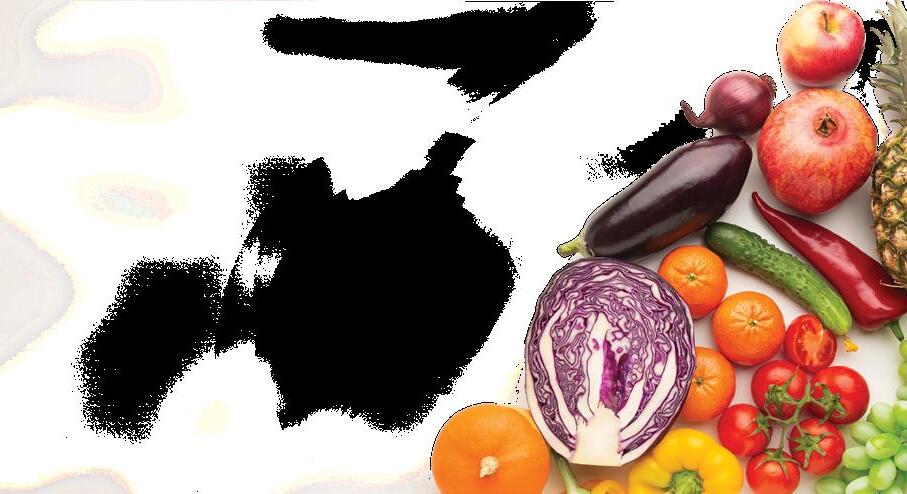
However, a number of challenges are currently threatening the long-term economic viability of the fresh produce sector worldwide, and thereby economic stability, food security and health. These challenges include substantial increases in costs, inefficiencies and delays in transportation, labour shortages, dwindling consumer purchasing power and obstacles to international trade, among other factors.
Ron Lemaire of the Canadian Produce Marketing Association and chairman of the Coalition, said the sector has shown great resilience in the face of the Covid-19 pandemic and has guaranteed consumers’ access to healthy and nutritious products. Rising costs will, however, ultimately be passed on to consumers in the form of reduced supplies and higher prices.
According to the report, such an outcome will make it harder for consumers the world over to eat a healthy diet. Indeed, to keep their food expenses in check, people will increasingly rely on low-cost staple foods or turn to unhealthy calories, such as those from soft drinks. In addition, the economic difficulties faced by fresh produce exporters in developing countries counter the impact of efforts towards poverty reduction, and threaten the livelihoods of millions of families.
The report calls upon national and international policymakers to urgently implement a number of measures to safeguard the supply of affordable fresh fruits and vegetables to consumers worldwide – and ensure the viability of a sector that is an important contributor to the economies of developed and developing countries alike.
“First and foremost, governments and international bodies across the globe should recognise fruits and vegetables as essential goods,” said Robert Guenther, Chief Public Policy Officer for the International Fresh Produce Association, and a member of the Coalition’s steering committee.
“By establishing that fruits and vegetables are fundamental to the health of populations and an essential element in the shift towards more sustainable food systems, other measures can be unlocked to ensure their consistent supply,” Guenther stated.
Among the measures advocated in the report are:
• Help fresh produce operators shoulder the burden of increased energy bills;
• promote the creation of safe and good-paying jobs in the fresh produce industry and in transportation, and encourage young people to pursue careers in these sectors;
• ensure undisrupted and priority access for fresh fruit and vegetables to all transportation networks, and develop integrated, multimodal transportation solutions; create priority lanes for imported fresh produce, to ensure quick offloading and transit in seaports and other points of arrival;
• address the causes of inefficiencies at seaports, and implement measures to minimise bottlenecks and improve operational practices to ensure the seamless movement of fresh produce;
• work towards the harmonisation and mutual recognition of sanitary, phytosanitary and other market entry requirements to enable operators to seize export and import opportunities;
• promote the consumption of fruits and vegetables by exempting fresh produce from value added tax, stepping up information campaigns and offering more fruits and vegetables through school feeding programmes.
Philippe Binard, General Delegate of Freshfel Europe and member of the Global Coalition of Fresh Produce, stated that by virtue of their health benefits and low environmental footprint, fresh fruits and vegetables are an essential part of the solution to global problems such as climate change and malnutrition.
about new ideas that can take the ARC to the next level.
The conference served as a platform for sharing research findings and developments that can assist the country in dealing with several challenges in the agricultural sector. Retired researchers were invited to speak on different topics pertinent to the agenda and programme of the conference, such as climate-smart agricultural programmes.
“Unless effective measures are implemented urgently, the report argues, the current challenges facing the sector will have long-lasting impacts on economies – and consumers – the world over, including bankruptcies, legal disputes, food inflation, food shortages and more. It is time to take action,” Binard said.

As the deepening energy crisis continues to present problems for different parts of the agricultural sector, another major challenge looms: a change in weather conditions from favourable rains to drier, hotter conditions. This would be the outcome if there is a switch from the prolonged period of the La Niña weather phenomenon to El Niño.
WANDILE SIHLOBO AGBIZSouth Africa has had a good four seasons of La Niñainduced above-average rains from 2019/20 to 2022/23. These supported agriculture, leading to higher yields across various field crops, fruits and vegetables. The livestock industry also benefited from improved grazing pasture.
Having four consecutive La Niña seasons was unusual. The typical cycle is two seasons of higher rainfall followed by normal to drier seasons. Excluding the current trend, the only other similar period in the recent past ran through 2007/08, 2008/09, and 2009/10 production seasons.
Scientists at the International Research Institute for Climate & Society at Columbia University now warn of the likelihood of El Niño kicking in later this year. In its update, the Institute stated that “the likelihood of El Niño remains low through May-July 2023 (44% chance), but becomes the dominant category after that with probabilities in the 53-57% range”.
Such a weather phenomenon would bring below-normal rainfall and hotter temperatures in South Africa. This could resemble the bleak agricultural conditions witnessed during the most recent El Niño drought, in the 2015/16 season, when the harvest of maize, a staple crop, dropped to 8,2 million tonnes, well below South Africa’s annual consumption level of 11,8 million tonnes. This shortfall necessitated imports of maize to supplement domestic needs.
Other field crops, fruits, vegetables and livestock also experienced severe losses. But if the El Niño is mild, crop declines could resemble the 2018-2019 episodes, in which the reduction in staple crops such as maize was not as aggressive. The
total maize harvest that year was 11,8 million tonnes, in line with annual consumption. By comparison, in the past three seasons (excluding 2022/23), SA’s maize harvest averaged 16,8 million tonnes and ensured that the country remained a net exporter of maize.
In the case of fruit and vegetables, a sizeable area relies on irrigation. In the livestock sector, specifically dairy, irrigation is just as necessary. While the effect of lower rainfall is not as immediate, prolonged drought presents big risks to SA’s food security.
Even more worrying is that the agricultural regions that irrigate face continuous interruptions due to load shedding. Organised agriculture and the Department of Agriculture, Land reform and Rural development are working on near- and longterm interventions to assist the sector.

One option that should receive serious consideration is incentives for self-generation, even if only covering a few critical parts of each business. The window for this option is limited, about eight months before we see the potential intensification of El Niño. For regions that already irrigate, reducing load shedding is the only option as farmers are seeing losses daily. The same extends to livestock, aquaculture (mainly abalone farms), dairy and poultry businesses, as well as various food, fibre and beverages value chain businesses.
The challenge of El Niño-induced drought will not be limited to SA but will be felt across Southern Africa. The last intense drought cycles led to increased food insecurity in the region. This is a particular risk if the upcoming summer season is dominated by drought.
Policymakers in the region should be aware of this creeping challenge and plan accordingly to support communities that heavily rely on agriculture.
For more subscribe below